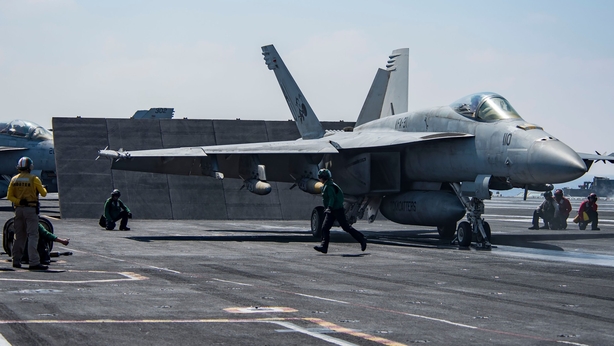The British government has agreed on the "need to take action" over a suspected chemical weapons attack in Syria, British Prime Minister Theresa May's office said.
"Cabinet agreed on the need to take action to alleviate humanitarian distress and to deter the further use of chemical weapons by the Assad regime," Downing Street said after Mrs May met her cabinet.
Ministers "agreed the prime minister should continue to work with allies in the United States and France to coordinate an international response," her office added.
US President Donald Trump has met his national security team on the situation in Syria and "no final decision has been made," the White House said in a statement.
"We are continuing to assess intelligence and are engaged in conversations with our partners and allies," the statement said.
President Trump and Mrs May have agreed that the use of chemical weapons must not go unchallenged and there is a need "to deter the further use of chemical weapons by the Assad regime."
The two leaders also agreed to work closely together on the international response to the suspected chemical weapons attack in Syria during a fresh phone call on the crisis tonight.
Downing Street released a statement following the phone call.
It said: "The Prime Minister spoke to President Trump about Syria this evening.
"They agreed that the Assad regime had established a pattern of dangerous behaviour in relation to the use of chemical weapons.
"They agreed it was vital that the use of chemical weapons did not go unchallenged, and on the need to deter the further use of chemical weapons by the Assad regime.
"They agreed to keep working closely together on the international response."
White House spokeswoman Sarah Huckabee Sanders said US officials are "continuing to assess intelligence" and are "engaged in conversations with our partners and allies."
President Trump has threatened missile strikes on Syria in response to the suspected poison gas attack.
The suspected chemical weapons attack late Saturday night killed at least 60 people and more than 1,000 injured in several sites in Douma.
We need your consent to load this rte-player contentWe use rte-player to manage extra content that can set cookies on your device and collect data about your activity. Please review their details and accept them to load the content.Manage Preferences
Fears of confrontation between Russia, Syria's big ally, and the west have been running high since Mr Trump said yesterday that missiles "will be coming" in response to the attack, and lambasted Moscow for standing by Syrian President Bashar al-Assad.
"Never said when an attack on Syria would take place. Could be very soon or not so soon at all!" Mr Trump wrote in a tweet today.
Later, he said: "We're having a number of meetings today, we'll see what happens. Now we have to make some ... decisions, so they'll be made fairly soon."
French President Emmanuel Macron said France had proof the Syrian government carried out the attack near Damascus, which aid groups have said killed dozens of people, and will decide whether to strike back when all the necessary information has been gathered.
"We have proof that last week ... chemical weapons were used, at least with chlorine, and that they were used by the regime of Bashar al-Assad," Mr Macron said, without offering details of any evidence.
"We will need to take decisions in due course, when we judge it most useful and effective," Mr Macron told broadcaster TF1.

Russia has requested that the UN Security Council meet tomorrow to discuss the threat of US-led military action in Syria, diplomats said.
The request came after Russian Ambassador Vassily Nebenzia said the priority was to avert US-led strikes on Syria that could lead to a dangerous confrontation between Washington and Moscow.
Syria and its backers, Russia and Iran, have said reports of the attack were fabricated by rebels and rescue workers in Douma and have accused the US of seeking to use it as a pretext to attack the Syrian government.
In Washington, US Defence Secretary Jim Mattis told Congress he believed there was a chemical attack in Syria, but added a short while later that the US had not made any decision to launch military action in Syria.
NBC News reported that US officials obtained blood and urine samples from victims of the Douma attack that tested positive for chemicals, mainly for chlorine and some for a nerve agent.
The officials said they were "confident" in the intelligence though not 100% sure, NBC News said on its website.
Read more:
- How the West might attack Syria
- Russia warns US of 'grave repercussions' if Syria attacked
- Key questions as tensions rise after Syria attack
- Russia's 12 UN vetoes on Syria
A team of experts from the global chemical weapons watchdog, the Organisation for the Prohibition of Chemical Weapons, is travelling to Syria and will start an investigations tomorrow, the Netherlands-based agency said.
It was not clear whether Mr Trump and US allies would wait for the results of the investigation before deciding on a possible strike.
Russia said it deployed military police in Douma today after the town was taken over by government forces.
"They are the guarantors of law and order in the town," RIA news agency quoted Russia's defence ministry as saying.
Meanwhile, the Taoiseach has said it is necessary that a full investigation be carried out into the attack in Douma.
Leo Varadkar said he understands this will be carried out by the Organisation for the Prohibition of Chemical Weapons.
Mr Varadkar said that in terms of any action being taken by other countries, he is very much of the view that it should not be unilateral and that in these situations it should be multilateral, and through the United Nations if possible.

